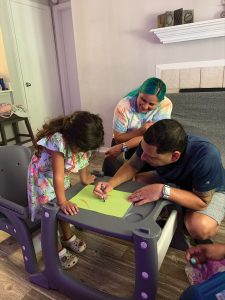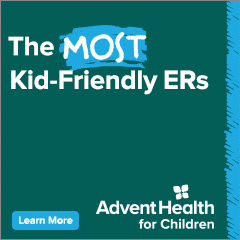A Constant Community
 Education, in all its forms, is an invaluable asset. When approached correctly, an academic education encourages the curiosity, confidence and critical thinking that help a child blossom into a citizen ready to take on the world. Beyond that, an emotional education that develops soft skills helps parents in need provide for and support their families in ways that give their children a leg up the prior generation may have been denied, breaking old patterns and gently doing away with familiar crutches that have long outlived their purpose.
Education, in all its forms, is an invaluable asset. When approached correctly, an academic education encourages the curiosity, confidence and critical thinking that help a child blossom into a citizen ready to take on the world. Beyond that, an emotional education that develops soft skills helps parents in need provide for and support their families in ways that give their children a leg up the prior generation may have been denied, breaking old patterns and gently doing away with familiar crutches that have long outlived their purpose.
The staff and volunteers at the nonprofit Children’s Home Society (CHS) of Florida are some of the region’s biggest champions of early, supplemental, life-skill and lifelong education for all those reasons and more.
CHS’s Florida chapter has been connecting children and their communities—both at home and at school—with the resources, disability support, educational equity and holistic approach to help every child in its orbit feel safe and secure as they learn that a whole team is encouraging them to realize their full potential.
“Our client is the parent-child relationship,” says AnnaMaria Alvarado. “In turn, that supports the child’s academic success, because the parent is engaged at home—in their environment—and is also attending parent meetings at school, or being part of parent committees. Parents exit out of our programs empowered to be engaged and a voice for their children in an academic setting.”
Alvarado would know a thing or two about CHS’s impact: She’s been with the nonprofit for 12 years but first came to CHS as a client. “Everyone’s experiences are different, but I can honestly understand and empathize and feel all the feelings our parents are,” she says. She has “no regrets” about joining a mission she wholeheartedly believes in after living its success firsthand, which helps her develop that deep-seated, ironclad trust that CHS prides itself on.
After all, success feels much more within reach when a child has stable ground beneath them and a strong support network behind them, and that starts with empowering parents—often right in their homes, with a dedicated home visitor cultivating a warm, trusting relationship tailored to every family’s needs and goals.
“We highly stress literacy and reading, which further strengthens the parent-child bond as they’re reading and looking at books and telling stories,” says Martha Fitzpatrick. “For language development, we highly stress conversations: Sometimes parents forget to talk to their little one, so we show them that every opportunity is an opportunity to talk to their child, even if it’s just narrating what’s going on around them.”
Fitzpatrick has been with CHS for more than 20 years and currently serves as director of Early Head Start (EHS), which utilizes an established curriculum to capitalize on the rich learning opportunities early-development phases present, ensuring that low-income families—particularly pregnant single mothers, and parents with special-needs or foster children 3 years and younger—have access to educational opportunities before a child’s pre-K years.
EHS includes a one-on-one home visitor providing parenting support, facilitating social time with other parents, milestone and educational assessments, access to behavioral or nutritional experts, and more. Like many CHS services, EHS “heavily stresses that a parent is a child’s first teacher,” according to Fitzpatrick, and underscores how important it is to meet a family where they are so services can be tailored to perfectly complement their home life and family dynamics.
“Home services are crucial, and specifically for children with identified special needs, an individual family support plans help parents navigate what they need to do to set up that foundation a child needs to be successful in the classroom,” adds Alvarado, who was named assistant director of EHS almost a year ago. “Home visiting is a unique opportunity for families to receive quality, early-childhood services in the family’s natural setting.”
Education lays a strong foundation for not only academic exploration but also good habits, logical processing, problem solving and so many other necessary life skills. Offering an array of programs and individually tailored outreach efforts helps ensure that CHS provides an essential educational cornerstone that’s both accessible and relevant to each client’s situation.
No matter what kind of services or support someone needs the most, though, the goal is always the same.
“Everybody faces tough times, and CHS is here to make sure you don’t go through them alone,” says Heather Morgan, senior vice president, communications, marketing and engagement. “With all of our programs, especially with our early-childhood programs, we’re there side-by-side with parents throughout their journey so we can celebrate together, face challenges together and help families get to that next step. It’s a completely safe space for everyone.”
Typically provided in English or Spanish, EHS and other programs embody CHS’s cradle-to-career approach to supporting a child from before they’re even born to the day they’re ready to make their mark on the world as an upstanding citizen—or as parents themselves.
And Morgan has the stats to prove that EHS is just as effective as its champions say: 90% of its children enrollees meet or exceed their social-emotional, literacy and math goals; 97% meet or exceed their physical goals; 87% meet or exceed their language goals; and 91% meet or exceed in cognition.
“The brain develops so rapidly between 0 and 5, so when we’re able to prepare children in those first three years, by the time they’re entering the school system at 5 or 6, they are right on track for where they need to be,” she says.
Support doesn’t mean much when that well-meaning assistance comes from a misguided, misinformed place, which is why CHS staff and volunteers invest so much time and energy into getting to know the children, parents, families, schools and communities they serve. It’s the only way they can facilitate the kind of trust, actionable insight and shared feedback that get to the heart of the matter and ultimately lead to systemic change.
Morgan points to CHS’s work with Evans High School to explain how programs like Community Partnership Schools have the kind of awe-inspiring, impactful results they do. Since its launch in 2010, that partnership with the University of Central Florida has allowed the CHS team to work with dozens of Florida elementary, middle and high schools to transform tens of thousands of lives—starting with Evans, where the program was piloted.
At the time, Evans had a graduation rate of 64%. Morgan notes that the school was used to being promised the world only to have those hopes dashed when the challenge proved to be too much. She recalls how diligently CHS had to court the school to prove it was all-in—a leap of faith on the school’s part that eventually led to the discovery that students’ poor academic performance was rooted in hunger.
“The backbone of helping a Community Partnership School is learning what their needs are, rather than making an assumption. So you see that 64% graduation rate and think, ‘Well, let’s bring in tutors, that must be the answer’—but what we found out from the needs assessment was that the students were so hungry, they couldn’t concentrate on anything else,” Morgan notes.
She adds that the first thing CHS and its partners did was bring in “snack cabinets” and incentivize tutoring sessions with accompanying hot dinners. Suddenly, Evans’ graduation rate was soaring, ultimately landing on the 99% it boasts today.
While anyone can benefit from CHS’s services, many—though not all—clients are facing some sort of financial hardship, or have a child with special needs who benefits from supplemental support. But the most prevailing commonality they share is actually the need for a community.
“A lot of them may not have a lot of support around them, they might not have any family around,” Morgan observes. “And if they don’t have a big support system around them, they might not even have things like a baby shower, which is where expectant mothers get so many of the things they need for a new baby.”
That’s why things like CHS’s welcome home kits—volunteer-curated containers filled with receiving blankets, bottles, diaper cream, pacifiers and all “the things first-time mothers need”—are resounding successes that Morgan says not only help a new parent confidently and competently navigate their new responsibilities but also “feel that love from a community” responding to their specific needs.
And that community grows with every new client and new family CHS throws its support behind, which often comes in response to enthusiastic word-of-mouth feedback and referrals to the parents who’ve seen firsthand how emotionally and academically fruitful a positive parent-child bond can be.
While the CHS team works tirelessly to put every child and their families on a path to success, they can’t do it without volunteer and overall community support.
“If we had an ask for the community, it would be volunteerism—we receive donations of things for pregnant moms and children from 0 to 3 from our philanthropy department—and just spreading the word about our programs to families who could take advantage of that opportunity,” Fitzpatrick notes.
After all, as Alvarado notes, “It takes a village to raise a child”—and it takes a community to support a family through life’s inevitable tough times.
“The programs and services we provide in the community are extremely needed—and they work,” adds Morgan. “One of the moms we support, she had her baby during the pandemic and was packing her hospital bag while her home visitor was on FaceTime with her, and she said she felt like she was packing with her best friend.”








